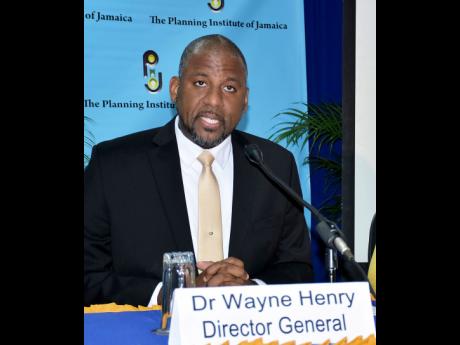Alpart reopening juices economy, 1.1% growth recorded in Dec quarter
The Planning Institute of Jamaica (PIOJ) has credited the resumption of operations at the Alpart alumina refinery in St Elizabeth for the 15 per cent increase in the mining and quarrying industry during the October to December 2017 quarter when the Jamaican economy expanded by 1.1 per cent.
The plant made its first shipment under new Chinese owner JISCO in the quarter. JISCO is reported to have spent US$60 million on the reopening, after acquiring Alpart from UC Rusal for US$299 million.
For the calendar year 2017, real GDP was estimated to have increased by just 0.5 per cent, representing a much lower than projected performance compared with the initial growth forecast within the one to two per cent range, PIOJ Director General Dr Wayne Henry said.
"This performance was below expectation as downside risks to growth cited at the beginning of the year materialised," said Henry at his quarterly press briefing Tuesday.
Among those risks were weather-related shocks which negatively impacted some industries and plant downtime due to technical problems at some plants, he said
"The realisation of these supply side constraints highlights the need to place more focused efforts on the implementation of climate change mitigation strategies. This includes, for example, protecting agriculture, using greenhouses and irrigation systems to foster greater resilience and sustainability in domestic agricultural production," the director general said.
"Additionally, the retooling of plants to reduce plant downtime due to technical problems is of critical importance."
Among the key drivers of growth during the October to December quarter were increased external demand from Jamaica's main trading partners, which supported increased exports of some goods and services, he said.
REASONS FOR GROWTH
It was also attributable to increased hotel room and air seat capacity, which facilitated growth in stopover visitor arrivals, increased capacity utilisation in the mining and quarrying industry, as well as major infrastructure works, including the construction and renovation of hotels and residential and commercial building activities.
"However, despite the positive out-turn, economic performance was constrained by above normal rainfall levels during and prior to the review quarter," Henry said.
"This adversely impacted agricultural output both with respect to hindering the recovery efforts of crops requiring a longer maturation period as well as short-term crops for which replanting was impeded," he explained.
The PIOJ estimated that during the review quarter agriculture, forestry and fishing, which usually contributed the lion's share of economic growth, declined by one per cent. However, there was an increase in traditional export crops, up 11.1 per cent.
The manufacture industry declined by 0.2 per cent, while the construction industry grew by one per cent; the electricity and water supply industry grew by 0.3 per cent; transport, storage and communication was up 1.2 per cent, and the finance and insurance services industry grew one per cent.
Growth of 0.5 per cent was recorded for the wholesale and retail trade, repair and installation of machinery, while hotels and restaurants increased by 5.7 per cent.
The PIOJ is estimating GDP growth for fiscal year ending March 2018 to be in the range of 0.5 to 1.5 per cent, and that the economy will expand within a two per cent to three per cent in FY 2019.

